Module 2 Experiences总复习课件(共31张PPT)
文档属性
| 名称 | Module 2 Experiences总复习课件(共31张PPT) |
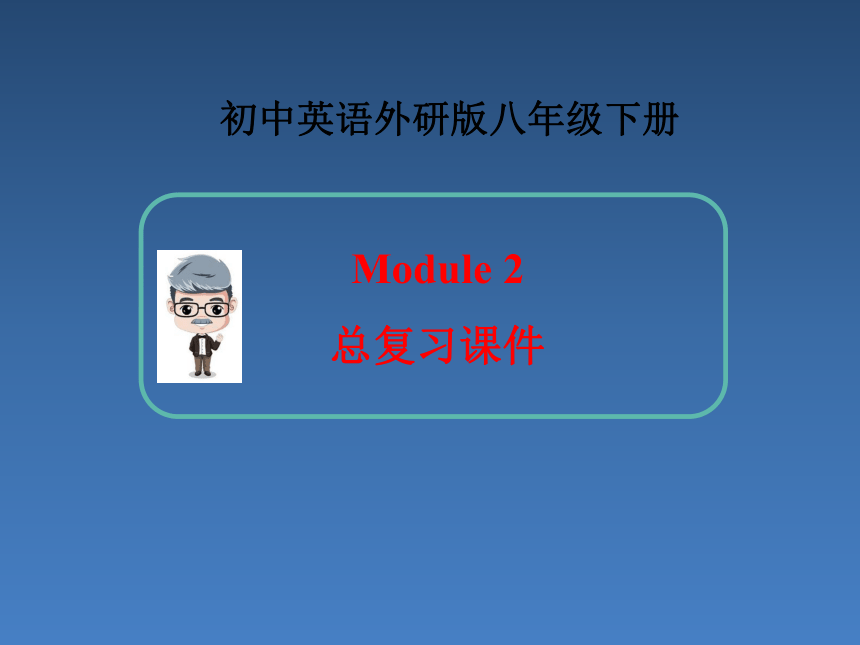
|
|
| 格式 | ppt | ||
| 文件大小 | 1.4MB | ||
| 资源类型 | 教案 | ||
| 版本资源 | 外研版 | ||
| 科目 | 英语 | ||
| 更新时间 | 2022-06-13 00:00:00 | ||
图片预览

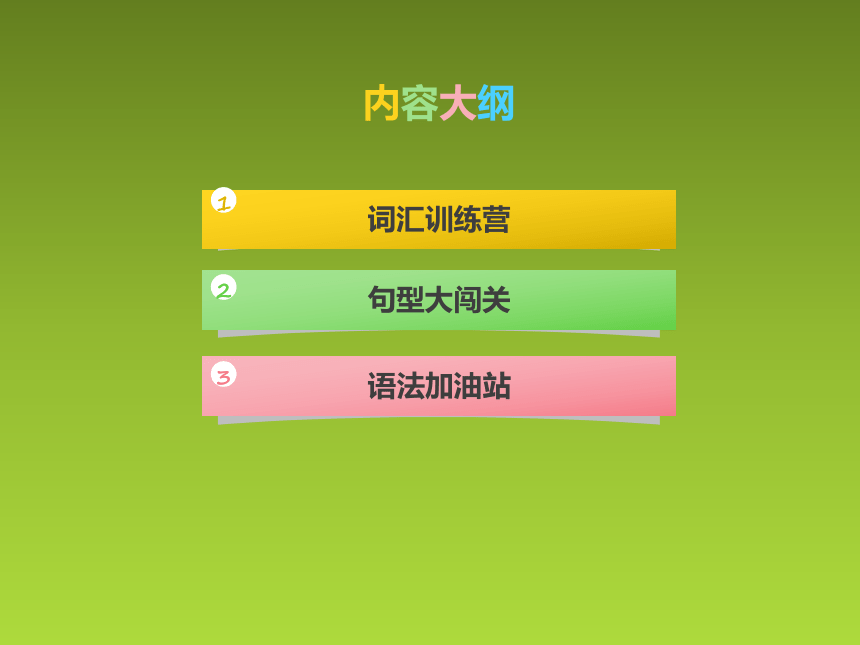

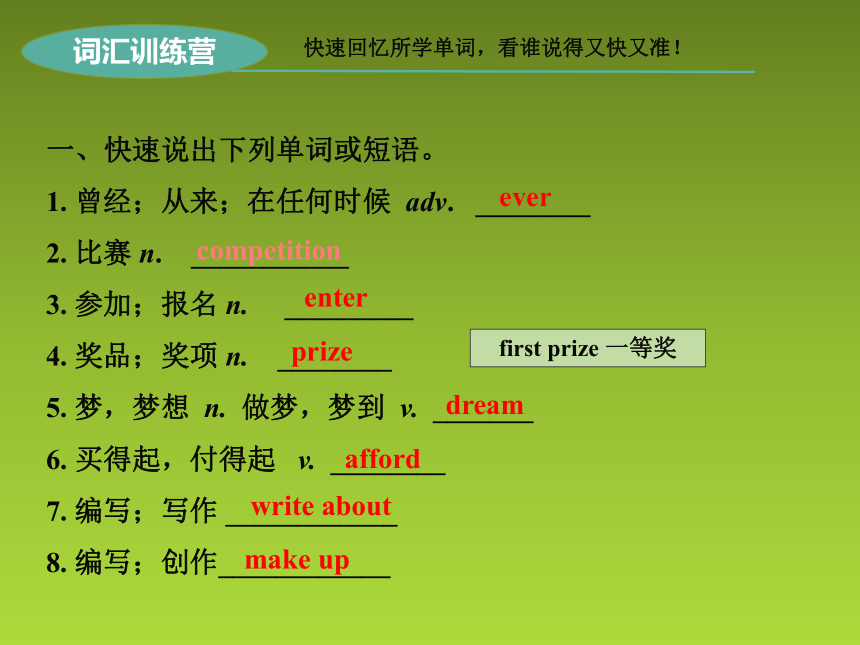
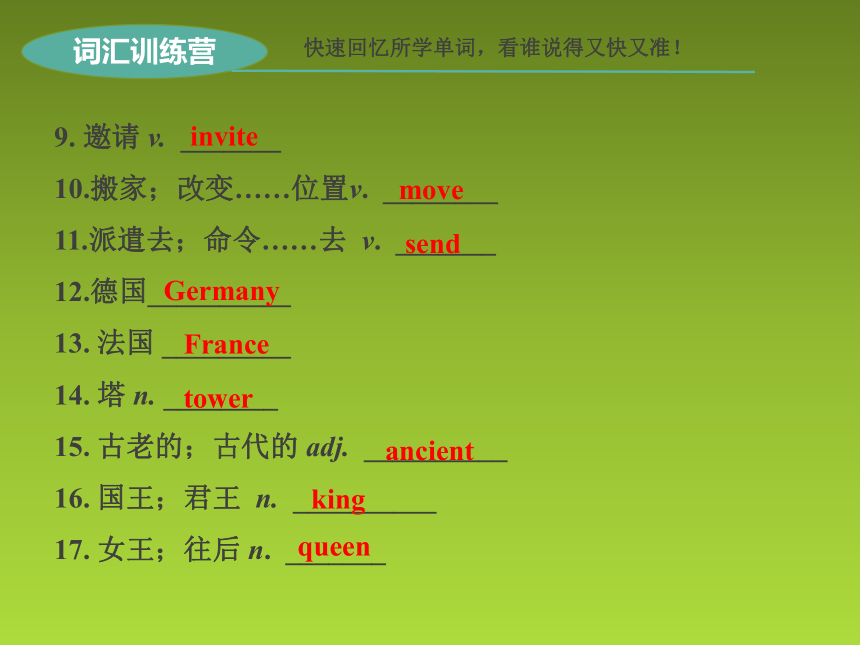
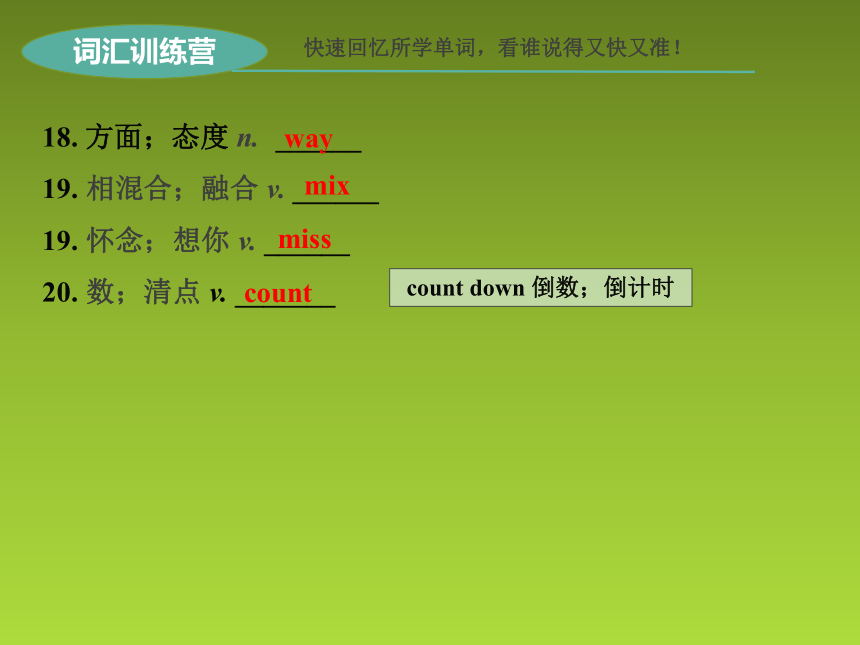
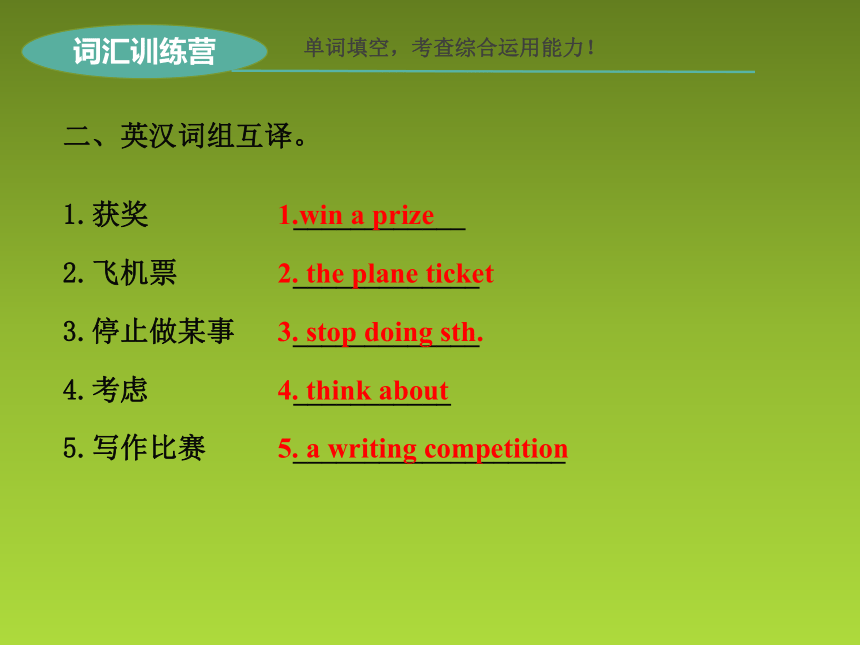
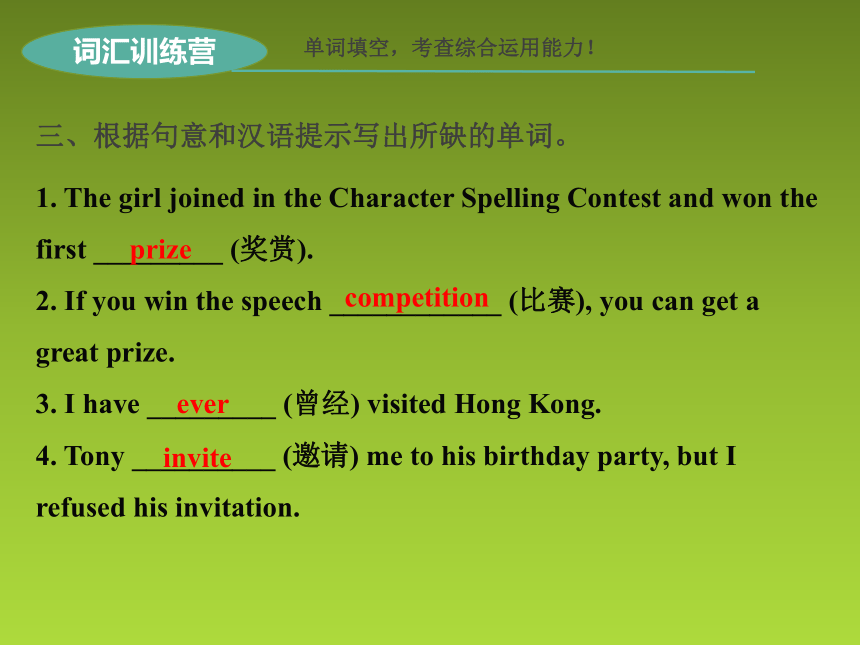
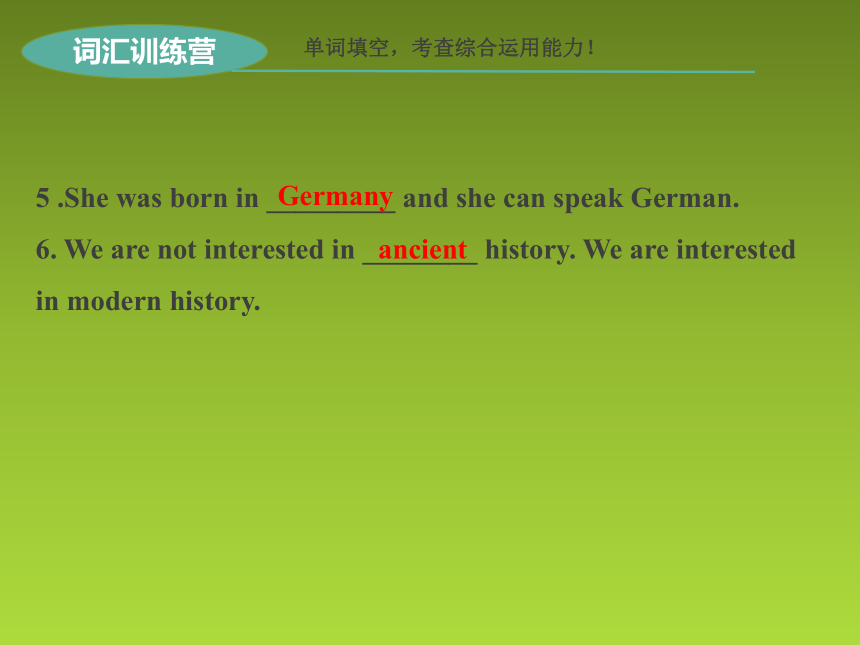

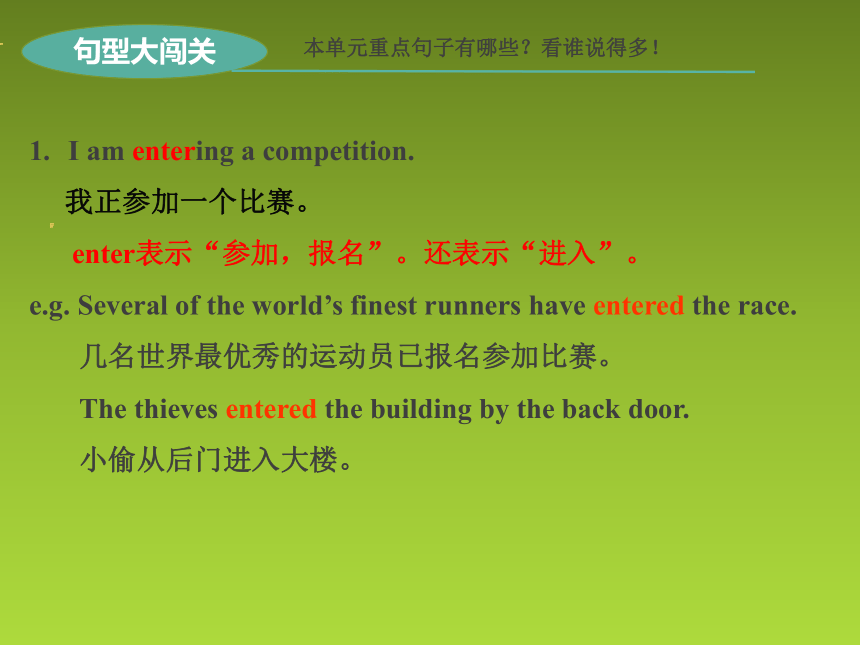
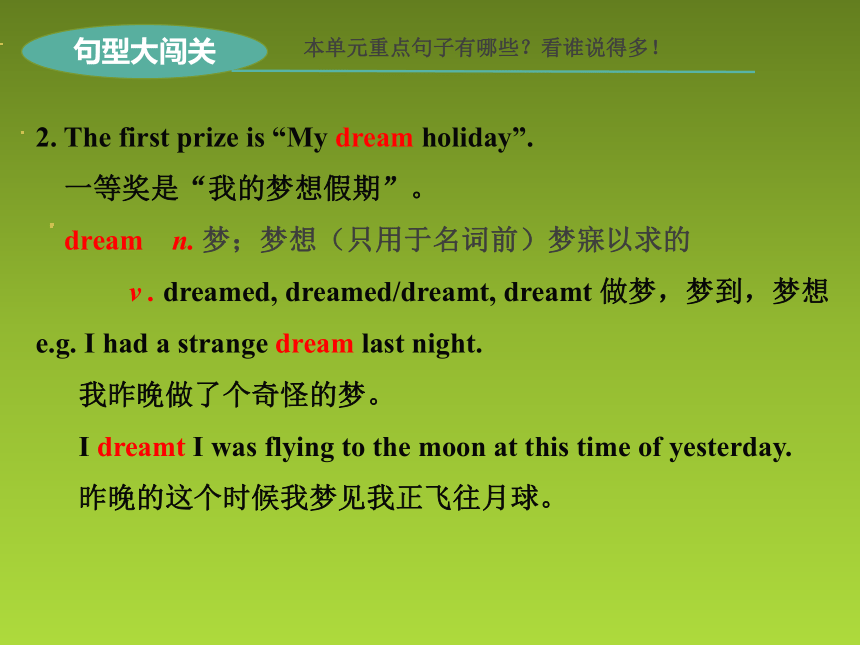
文档简介
(共31张PPT)
初中英语外研版八年级下册
Module 2
总复习课件
词汇训练营
1
句型大闯关
2
语法加油站
3
内容大纲
词汇训练营
一、快速说出下列单词或短语。
1. 曾经;从来;在任何时候 adv. ________
2. 比赛 n. ___________
3. 参加;报名 n. _________
4. 奖品;奖项 n. ________
5. 梦,梦想 n. 做梦,梦到 v. _______
6. 买得起,付得起 v. ________
7. 编写;写作 ____________
8. 编写;创作____________
ever
competition
enter
prize
dream
afford
词汇训练营
快速回忆所学单词,看谁说得又快又准!
write about
make up
first prize 一等奖
9. 邀请 v. _______
10.搬家;改变……位置v. ________
11.派遣去;命令……去 v. _______
12.德国__________
法国 _________
塔 n. ________
古老的;古代的 adj. __________
国王;君王 n. __________
女王;往后 n. _______
invite
move
send
Germany
词汇训练营
快速回忆所学单词,看谁说得又快又准!
France
tower
ancient
king
queen
18. 方面;态度 n. ______
19. 相混合;融合 v. ______
19. 怀念;想你 v. ______
20. 数;清点 v. _______
way
mix
miss
count
词汇训练营
快速回忆所学单词,看谁说得又快又准!
count down 倒数;倒计时
词汇训练营
单词填空,考查综合运用能力!
二、英汉词组互译。
1.获奖 ____________
2.飞机票 _____________
3.停止做某事 _____________
4.考虑 ___________
5.写作比赛 ___________________
1.win a prize
2. the plane ticket
3. stop doing sth.
4. think about
5. a writing competition
词汇训练营
单词填空,考查综合运用能力!
1. The girl joined in the Character Spelling Contest and won the first _________ (奖赏).
2. If you win the speech ____________ (比赛), you can get a great prize.
3. I have _________ (曾经) visited Hong Kong.
4. Tony __________ (邀请) me to his birthday party, but I refused his invitation.
三、根据句意和汉语提示写出所缺的单词。
prize
competition
ever
invite
词汇训练营
单词填空,考查综合运用能力!
5 .She was born in _________ and she can speak German.
6. We are not interested in ________ history. We are interested in modern history.
Germany
ancient
句型大闯关
句型大闯关
本单元重点句子有哪些?看谁说得多!
I am entering a competition.
我正参加一个比赛。
enter表示“参加,报名”。还表示“进入”。
e.g. Several of the world’s finest runners have entered the race.
几名世界最优秀的运动员已报名参加比赛。
The thieves entered the building by the back door.
小偷从后门进入大楼。
句型大闯关
本单元重点句子有哪些?看谁说得多!
2. The first prize is “My dream holiday”.
一等奖是“我的梦想假期”。
dream n. 梦;梦想(只用于名词前)梦寐以求的
v . dreamed, dreamed/dreamt, dreamt 做梦,梦到,梦想
e.g. I had a strange dream last night.
我昨晚做了个奇怪的梦。
I dreamt I was flying to the moon at this time of yesterday.
昨晚的这个时候我梦见我正飞往月球。
句型大闯关
本单元重点句子有哪些?看谁说得多!
3. Have you ever won any prizes before
你以前曾经得过奖吗?
ever表示“曾经”,是现在完成时的标志。通常用于一般疑
问句中。
“have/has sb. ever + 过去分词”,用于询问某人过去的经历。
e.g. —Have you ever been to Paris
—No, never. / Yes, I have.
—你去过巴黎吗? — 没有/ 去过。
句型大闯关
本单元重点句子有哪些?看谁说得多!
4. But I can’t afford it. 但是我付不起。
afford v. (有财力)付得起,买得起,常与can, could, able to
连用。
e.g.
I just can’t afford the time. 我花不起这个时间。
句型大闯关
本单元重点句子有哪些?看谁说得多!
5. I’ve stopped trying now. 我已经不再尝试了。
stop doing sth. 表示“停止正在做的事情”
stop to do sth. 表示“停下正在做的事去做另件事”
e.g. The two girls stopped talking when they saw me.
那两个女孩一见到我就停止了讲话。
The two girls stopped to talk to me when they saw me.
那两个女孩一见到我就停下来和我讲话。
句型大闯关
本单元重点句子有哪些?看谁说得多!
6. You can make it up. 你可以编(一个故事)。
make up 表示“编造;组成”。
e.g.
Farming and mining make up most of the country’s industry.
农业和矿业构成这个国家的大部分产业。
The whole story is made up. 整个故事是虚构出来的。
句型大闯关
本单元重点句子有哪些?看谁说得多!
7. …, and it has sent Peter to work in Germany, France and China before.
1) send sb. to do sth. 表示“派遣某人去做某事”。
e.g. China send many people to work in Africa every year.
2) send后接“信件、电报”等时,意为“寄/发送”。
e.g. Mary usually sends letters in the morning.
3) before,表示“以前”。是现在完成时的标志。
句型大闯关
本单元重点句子有哪些?看谁说得多!
8. They have been to many interesting places.
have been to +地点,表示“已经去过某地” 现在已经回来 。
e.g. Laura has never been to China before.
have gone to +地点,表示“已经去了某地”,现在还没有回来,此时可能在途中或 已经到了目的地。
e.g.
—Hello. Can I speak to John, please
—Sorry, he’s not in. He has gone to the park.
句型大闯关
本单元重点句子有哪些?看谁说得多!
9. They find it hard to spell and pronounce the words.
find it+形容词+to do句型中,it是形式宾语,真正的宾语是后面的动词不定式。
e.g. I find it boring to watch TV all the time.
我发现一直看电视很无聊。
10. So far they have learnt to speak German, French, Chinese and Arabic.
so far “到目前为止”,是现在完成时 的标志。
e.g. Mike has read five famous books so far.
句型大闯关
本单元重点句子有哪些?看谁说得多!
11. This language is different from English in many ways.
这种语言在很多方面都和英语不同。
be different from 表示“与…不同”
in many ways 表示“在许多方面”
e.g. We can consider the problem in many ways.
我们可以从多方面来考虑这些问题。
Life in future will be different from life today.
在未来的生活将会从今天生活的不同。
句型大闯关
本单元重点句子有哪些?看谁说得多!
12. They are counting down the days.
count down, 表示“倒数,倒计时”。
e.g.
They are counting down, “ten, nine, eight, seven…”.
count表示“计数,计算”。
e.g.
Can you count from one to ten in French
He put all the money in his bag without counting it.
一、根据句意完成句子。
1. 他们已经去过埃及了,和拍了许多照片。
They ___________ Egypt and took many photos there.
2. 这两匹马在许多方面是不同的。
The two horses are different ____________.
3. 在学习的过程中,我发现学好英语是困难的。
During the study I find it hard _______ English well.
4. 到目前为止,珍妮还没为她父亲买到礼物。
______ Jane hasn’t bought her gift for her father.
句型大闯关
“学以致用”,你真的会用了吗?
in many ways
have been to
to learn
So far
二、单项选择
1. I have ______ lots of speaking competitions, but I lost.
A. helped B. stopped C. entered
2. I want to buy a new bike, but I can’t _____ it.
A. afford B. travel C. dream
3. Julia isn’t going to the cinema with us because she ______ the film.
A. sees B. saw C. has seen
句型大闯关
“学以致用”,你真的会用了吗?
C
A
C
语法加油站
语法加油站
现在完成时态的构成和用法,你学会了吗?
现在完成时(1)
定义:
表示过去发生或已经完成的动作对现在造成的影响,也可以表示过去已
经开始,一直延续到现在的动作或状态。
构成:
肯定句 主语+have / has+动词过去分词+其他
否定句 主语+haven’t/hasn’t+动词过去分词+ 其他
一般疑问句 Have / Has+主语+动词过去分词+其他
肯定答语 Yes, 主语+have / has.
否定答语 No, 主语+haven’t / hasn’t.
语法加油站
情态动词can的用法,你学会了吗?
1. 动词一般在词尾加“-ed”
如: work→worked→worked
2. 以“e”结尾的动词,词尾加“-d”
如: live→lived→lived
3. 以“辅音字母+ y”结尾的动词,将“y”变为 “i”,再加“-ed”
如:cry→cried→cried
规则动词过去分词的构成规则:
语法加油站
4. 以重读闭音节结尾,末尾只有一个辅音字母,先双写该辅音字母,再加“-ed”
如: stop→stopped→stopped
情态动词can的用法,你学会了吗?
语法加油站
情态动词can的用法,你学会了吗?
不规则动词的变化形式没有规律,需要记忆
如:
see-saw-seen;
eat-ate-eaten; break-broke-broken
go-went-gone; take-took-taken
send-sent-sent; find-found-found
make-made-made; have-had-had
一、句型转换。
1. I’ve already had dinner.(改为一般疑问句)
_____ you _____ dinner ______?
2. He has just finished his homework.(改为否定句)
He ______ __________ his homework _____.
3. Mum’s cooked the dinner. (改为否定句)
Mum _______ _______ the dinner.
语法加油站
学以致用,你掌握了吗?
Have had yet
hasn’t finished yet
hasn’t cooked
二、单项选择
( ) 1. — ______ you ever ______ with a group
— Yes, I have.
A. Did; study B. Are; studying
C. Were; studying D. Have; studied
( ) 2. How many times _____ you _____ to Beijing this year
A. have; been B. did; been
C. have; gone D. did; gone
语法加油站
学以致用,你掌握了吗?
D
A
( ) 3. — Lucy, _____ you ____ your ticket
— Not yet.
A. did; find B. have; found
C. has; found D. do; find
语法加油站
学以致用,你掌握了吗?
B
初中英语外研版八年级下册
Module 2
总复习课件
词汇训练营
1
句型大闯关
2
语法加油站
3
内容大纲
词汇训练营
一、快速说出下列单词或短语。
1. 曾经;从来;在任何时候 adv. ________
2. 比赛 n. ___________
3. 参加;报名 n. _________
4. 奖品;奖项 n. ________
5. 梦,梦想 n. 做梦,梦到 v. _______
6. 买得起,付得起 v. ________
7. 编写;写作 ____________
8. 编写;创作____________
ever
competition
enter
prize
dream
afford
词汇训练营
快速回忆所学单词,看谁说得又快又准!
write about
make up
first prize 一等奖
9. 邀请 v. _______
10.搬家;改变……位置v. ________
11.派遣去;命令……去 v. _______
12.德国__________
法国 _________
塔 n. ________
古老的;古代的 adj. __________
国王;君王 n. __________
女王;往后 n. _______
invite
move
send
Germany
词汇训练营
快速回忆所学单词,看谁说得又快又准!
France
tower
ancient
king
queen
18. 方面;态度 n. ______
19. 相混合;融合 v. ______
19. 怀念;想你 v. ______
20. 数;清点 v. _______
way
mix
miss
count
词汇训练营
快速回忆所学单词,看谁说得又快又准!
count down 倒数;倒计时
词汇训练营
单词填空,考查综合运用能力!
二、英汉词组互译。
1.获奖 ____________
2.飞机票 _____________
3.停止做某事 _____________
4.考虑 ___________
5.写作比赛 ___________________
1.win a prize
2. the plane ticket
3. stop doing sth.
4. think about
5. a writing competition
词汇训练营
单词填空,考查综合运用能力!
1. The girl joined in the Character Spelling Contest and won the first _________ (奖赏).
2. If you win the speech ____________ (比赛), you can get a great prize.
3. I have _________ (曾经) visited Hong Kong.
4. Tony __________ (邀请) me to his birthday party, but I refused his invitation.
三、根据句意和汉语提示写出所缺的单词。
prize
competition
ever
invite
词汇训练营
单词填空,考查综合运用能力!
5 .She was born in _________ and she can speak German.
6. We are not interested in ________ history. We are interested in modern history.
Germany
ancient
句型大闯关
句型大闯关
本单元重点句子有哪些?看谁说得多!
I am entering a competition.
我正参加一个比赛。
enter表示“参加,报名”。还表示“进入”。
e.g. Several of the world’s finest runners have entered the race.
几名世界最优秀的运动员已报名参加比赛。
The thieves entered the building by the back door.
小偷从后门进入大楼。
句型大闯关
本单元重点句子有哪些?看谁说得多!
2. The first prize is “My dream holiday”.
一等奖是“我的梦想假期”。
dream n. 梦;梦想(只用于名词前)梦寐以求的
v . dreamed, dreamed/dreamt, dreamt 做梦,梦到,梦想
e.g. I had a strange dream last night.
我昨晚做了个奇怪的梦。
I dreamt I was flying to the moon at this time of yesterday.
昨晚的这个时候我梦见我正飞往月球。
句型大闯关
本单元重点句子有哪些?看谁说得多!
3. Have you ever won any prizes before
你以前曾经得过奖吗?
ever表示“曾经”,是现在完成时的标志。通常用于一般疑
问句中。
“have/has sb. ever + 过去分词”,用于询问某人过去的经历。
e.g. —Have you ever been to Paris
—No, never. / Yes, I have.
—你去过巴黎吗? — 没有/ 去过。
句型大闯关
本单元重点句子有哪些?看谁说得多!
4. But I can’t afford it. 但是我付不起。
afford v. (有财力)付得起,买得起,常与can, could, able to
连用。
e.g.
I just can’t afford the time. 我花不起这个时间。
句型大闯关
本单元重点句子有哪些?看谁说得多!
5. I’ve stopped trying now. 我已经不再尝试了。
stop doing sth. 表示“停止正在做的事情”
stop to do sth. 表示“停下正在做的事去做另件事”
e.g. The two girls stopped talking when they saw me.
那两个女孩一见到我就停止了讲话。
The two girls stopped to talk to me when they saw me.
那两个女孩一见到我就停下来和我讲话。
句型大闯关
本单元重点句子有哪些?看谁说得多!
6. You can make it up. 你可以编(一个故事)。
make up 表示“编造;组成”。
e.g.
Farming and mining make up most of the country’s industry.
农业和矿业构成这个国家的大部分产业。
The whole story is made up. 整个故事是虚构出来的。
句型大闯关
本单元重点句子有哪些?看谁说得多!
7. …, and it has sent Peter to work in Germany, France and China before.
1) send sb. to do sth. 表示“派遣某人去做某事”。
e.g. China send many people to work in Africa every year.
2) send后接“信件、电报”等时,意为“寄/发送”。
e.g. Mary usually sends letters in the morning.
3) before,表示“以前”。是现在完成时的标志。
句型大闯关
本单元重点句子有哪些?看谁说得多!
8. They have been to many interesting places.
have been to +地点,表示“已经去过某地” 现在已经回来 。
e.g. Laura has never been to China before.
have gone to +地点,表示“已经去了某地”,现在还没有回来,此时可能在途中或 已经到了目的地。
e.g.
—Hello. Can I speak to John, please
—Sorry, he’s not in. He has gone to the park.
句型大闯关
本单元重点句子有哪些?看谁说得多!
9. They find it hard to spell and pronounce the words.
find it+形容词+to do句型中,it是形式宾语,真正的宾语是后面的动词不定式。
e.g. I find it boring to watch TV all the time.
我发现一直看电视很无聊。
10. So far they have learnt to speak German, French, Chinese and Arabic.
so far “到目前为止”,是现在完成时 的标志。
e.g. Mike has read five famous books so far.
句型大闯关
本单元重点句子有哪些?看谁说得多!
11. This language is different from English in many ways.
这种语言在很多方面都和英语不同。
be different from 表示“与…不同”
in many ways 表示“在许多方面”
e.g. We can consider the problem in many ways.
我们可以从多方面来考虑这些问题。
Life in future will be different from life today.
在未来的生活将会从今天生活的不同。
句型大闯关
本单元重点句子有哪些?看谁说得多!
12. They are counting down the days.
count down, 表示“倒数,倒计时”。
e.g.
They are counting down, “ten, nine, eight, seven…”.
count表示“计数,计算”。
e.g.
Can you count from one to ten in French
He put all the money in his bag without counting it.
一、根据句意完成句子。
1. 他们已经去过埃及了,和拍了许多照片。
They ___________ Egypt and took many photos there.
2. 这两匹马在许多方面是不同的。
The two horses are different ____________.
3. 在学习的过程中,我发现学好英语是困难的。
During the study I find it hard _______ English well.
4. 到目前为止,珍妮还没为她父亲买到礼物。
______ Jane hasn’t bought her gift for her father.
句型大闯关
“学以致用”,你真的会用了吗?
in many ways
have been to
to learn
So far
二、单项选择
1. I have ______ lots of speaking competitions, but I lost.
A. helped B. stopped C. entered
2. I want to buy a new bike, but I can’t _____ it.
A. afford B. travel C. dream
3. Julia isn’t going to the cinema with us because she ______ the film.
A. sees B. saw C. has seen
句型大闯关
“学以致用”,你真的会用了吗?
C
A
C
语法加油站
语法加油站
现在完成时态的构成和用法,你学会了吗?
现在完成时(1)
定义:
表示过去发生或已经完成的动作对现在造成的影响,也可以表示过去已
经开始,一直延续到现在的动作或状态。
构成:
肯定句 主语+have / has+动词过去分词+其他
否定句 主语+haven’t/hasn’t+动词过去分词+ 其他
一般疑问句 Have / Has+主语+动词过去分词+其他
肯定答语 Yes, 主语+have / has.
否定答语 No, 主语+haven’t / hasn’t.
语法加油站
情态动词can的用法,你学会了吗?
1. 动词一般在词尾加“-ed”
如: work→worked→worked
2. 以“e”结尾的动词,词尾加“-d”
如: live→lived→lived
3. 以“辅音字母+ y”结尾的动词,将“y”变为 “i”,再加“-ed”
如:cry→cried→cried
规则动词过去分词的构成规则:
语法加油站
4. 以重读闭音节结尾,末尾只有一个辅音字母,先双写该辅音字母,再加“-ed”
如: stop→stopped→stopped
情态动词can的用法,你学会了吗?
语法加油站
情态动词can的用法,你学会了吗?
不规则动词的变化形式没有规律,需要记忆
如:
see-saw-seen;
eat-ate-eaten; break-broke-broken
go-went-gone; take-took-taken
send-sent-sent; find-found-found
make-made-made; have-had-had
一、句型转换。
1. I’ve already had dinner.(改为一般疑问句)
_____ you _____ dinner ______?
2. He has just finished his homework.(改为否定句)
He ______ __________ his homework _____.
3. Mum’s cooked the dinner. (改为否定句)
Mum _______ _______ the dinner.
语法加油站
学以致用,你掌握了吗?
Have had yet
hasn’t finished yet
hasn’t cooked
二、单项选择
( ) 1. — ______ you ever ______ with a group
— Yes, I have.
A. Did; study B. Are; studying
C. Were; studying D. Have; studied
( ) 2. How many times _____ you _____ to Beijing this year
A. have; been B. did; been
C. have; gone D. did; gone
语法加油站
学以致用,你掌握了吗?
D
A
( ) 3. — Lucy, _____ you ____ your ticket
— Not yet.
A. did; find B. have; found
C. has; found D. do; find
语法加油站
学以致用,你掌握了吗?
B
同课章节目录
- Module 1 Feelings and impressions
- Unit 1 It smells delicious.
- Unit 2 I feel nervous when I speak Chinese .
- Unit 3 Language in use
- Module 2 Experiences
- Unit 1 I've also entered lots of speaking competi
- Unit 2 They have seen the Pyramids.
- Unit 3 Language in use
- Module 3 Journey to space
- Unit 1 Has it arrived yet?
- Unit 2 We have not found life on any other planet
- Unit 3 Language in use
- Module 4 Seeing the docto
- Unit 1 I haven't done much exercise since I got m
- Unit 2 We have played football for a year now
- Unit 3 Language in use
- Module 5 Cartoons
- Unit 1 It's time to watch a cartoon.
- Unit 2 Tintin has been popular for over eighty yea
- Unit 3 Language in use
- Revision module A
- Module 6 Hobbies
- Unit 1 Do you collect anything ?
- Unit 2 Hobbies can make you grow as a person.
- Unit 3 Language in use
- Module 7 Summer in Los Angeles
- Unit 1 Please write to me and send me some photos
- Unit 2 Fill out a form and come to learn English
- Unit 3 Language in use
- Module 8 Time off
- Unit 1 I can hardly believe we are in the city ce
- Unit 2 We thought somebody was moving about
- Unit 3 Language in use
- Module 9 Friendship
- Unit 1 Could I ask if you've mentioned this to he
- Unit 2 I believe that the world is what you think
- Unit 3 Language in use
- Module 10 On the radio
- Unit 1 I hope that you can join us one day
- Unit 2 It seemed that they were speaking to me in
- Unit 3 Language in use
- Revision module B
